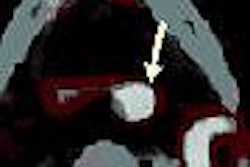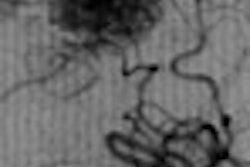Although MRI is still the gold standard when it comes to colorectal cancer staging, a new study from Italy shows that preoperative multidetector-row CT (MDCT) staging using a water enema may offer some advantages over air insufflation. Water appears to improve the ability to assess local disease extent by slightly increasing the density difference between the colon wall and lumen.
Dr. Maurizio Memio and colleagues from the University of Bari in Italy performed a virtual colonoscopy study of 76 patients with endoscopically proven colorectal cancer for preoperative staging.
The researchers divided their cohort into two groups: 38 patients received a water enema, and 38 underwent room-air insufflation. After insufflation with air or water, patients were imaged with MDCT.
"The purpose of our work was to evaluate the diagnostic accuracy of air versus water insufflation for local staging of colorectal cancer," Memio said in a presentation at the 2007 European Congress of Radiology (ECR) in Vienna. "MDCT staging was obtained and then compared with pathological staging after resection based on the well-known international TNM classification."
Based on axial CT images and multiplanar reformations, patients were staged as T1/T2, T3, and T4; nodal involvement was classified as N0, N1, and N2.
"As you know, CT even MDCT is not able to differentiate between T1 and T2 stages, essentially because CT is not able to detect differences between the lumen and the colon wall. This is why we consider together T1/T2 as one stage," Memio said.
The images were reviewed in a blinded fashion by two radiologists who are experts in colorectal cancer staging.
Using water-based CT colonography (CTC, or virtual colonoscopy), T1/T2 cancer was diagnosed in 13 of the 38 cases, 20 were staged as T3, and five as T4; furthermore, 14 of the 38 patients were considered N0, 13 as N1, and 11 as N2. Two stage T1/T2 cases and two stage T3 cases were missed using the water-enema method.
CTC with air insufflation diagnosed T1/T2 stage cancer in 13 of the 38 cases, T3 in 19, and T4 in six; nodal involvement was N0 in 18 cases, N1 in 11, and N2 in nine, Memio said.
Diagnostic accuracy for stages T1/T2 was 94.7% (36/38) with water, and 86.8% (33/38) using air insufflation. The overall accuracy in T staging for water and air-distended CTC was 89.4% and 78.9%, respectively, and 76.3% and 73.6%, respectively, in N staging.
"Diagnostic accuracy for T3 stage -- indicating tumor extending outside the colorectal rectal wall ... was quite low with both contrast media," Memio said. "These diagnostic accuracy results concerning T staging were influenced by under- and overstaging errors made by MDCT. It is difficult to always correctly differentiate localized tumors from tumors extending outside the colorectal wall."
Diagnostic accuracy for N staging was again low for both mediums and slightly higher with the water-enema method (76.3% versus 73.6% for air), but the difference was not statistically significant, he said.
The exam was technically adequate in all cases with no adverse events; the researchers took care to insufflate the colon slowly while communicating with the patient.
"Diagnostic accuracy concerning T staging was not so high with both contrast mediums, in accordance with the literature," Memio concluded. "But water enema with CTC showed a statistically significant and slightly superior accuracy (compared to) air CTC, probably related to the better ... difference in intensity between the wall and the luminal content. CT could be used as a secondary staging modality if MRI is not available," he added.
By Eric Barnes
AuntMinnie.com staff writer
May 3, 2007
Related Reading
MR colonography disappoints in reduced-prep protocol, March 6, 2007
Study gives MRI edge over CT, US in rectal cancer staging, March 7, 2003
Copyright © 2007 AuntMinnie.com




















